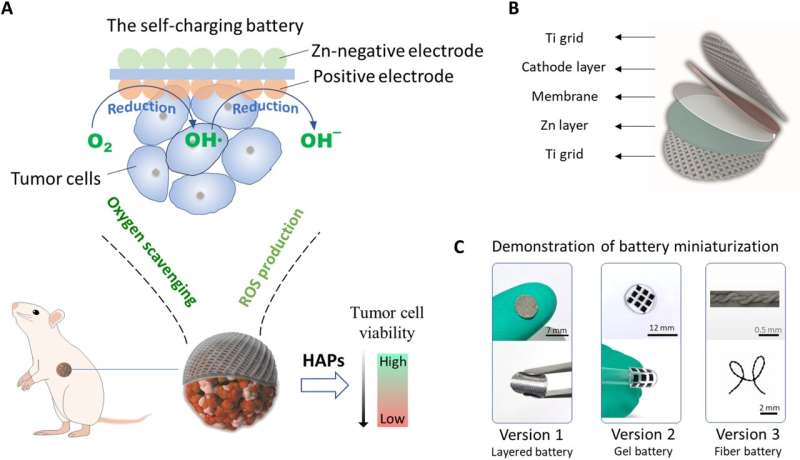April 3, 2023 report
This article has been reviewed according to Science X's editorial process and policies. Editors have highlighted the following attributes while ensuring the content's credibility:
fact-checked
peer-reviewed publication
trusted source
proofread
Implantable oxygen-eating batteries help kill cancer

Despite decades of research and tens of billions of dollars for research and treatments worldwide, the battle against cancer continues.
Progress has been made through conventional treatments such as surgery, radiotherapy, chemotherapy and drugs. But these treatments, often painful and costly, can create troublesome side effects. Healthy body cells can be adversely affected and cancers vanquished in one spot may reappear elsewhere.
Newer technologies have allowed doctors to implant minuscule drug delivery systems into body tissue that more precisely target infected areas. But issues with biocompatibility and permeability remain challenges.
Now researchers at Fudan University in Shanghai say they may have a better approach to combating cancer. In a paper published last week in the journal Science Advances, Fan Zhang and Yongyao Xia reported that an implantable self-charging battery that consumes oxygen can zero in on cancer cells and help kill them.
Tumor cells generally have low oxygen levels, a condition known as hypoxia. This has provided medicine with an attractive target and a clear goal: Design a drug-delivery system that seeks out a low-oxygen environment and supplement it with cancer-killing medication.
Previously, this approach had only limited success due to inadequate or uneven hypoxia levels in solid tumors. But Zhang and Xia said their approach targets the environment of the cell rather than the cell itself.
"Using implantable devices to regulate tumor microenvironment 'in situ' may be a more effective way for cancer therapy," they said.
The knew that if they could increase the degree of hypoxia, a tumor site would be more easily identifiable. So they designed a self-charging salt-water battery that can "persistently regulate oxygen content … in a tumor microenvironment."
The battery is part of a two-stage approach to eradicating tumors. It increases and maintains the state of hypoxia while tumor-killing drugs designed to identify cancer cells in low-oxygen regions are deployed. By limiting drug application to the low-oxygen regions, there is little or no impact on healthy oxygen-rich cells.
In a small study, the battery/drug approach completely eliminated tumors in 80% of the mice.
According to Zhang, the battery can continuously consume oxygen within a tumor cell for more than 14 days.
"This work is a crossover study between battery technology and biotherapy," Xia said. "[It] not only provides a new treatment method for anti-tumor therapy, but also creates a precedent for batteries in biomedical applications."
The authors of the report say despite early impressive results, more research is needed. Although no serious side effects were noted in the mouse study, standards for humans are stricter. Compatibility with human tissue must still be confirmed. But the researchers say the technique holds great promise for application in other devices.
"The battery components are biocompatible, which minimized the harm of battery implantation," they said. "Moreover [there is] great potential to develop other therapeutic devices, such as electrochemiluminescence, wearable devices, interventional therapies, inflammatory microenvironment regulation, and electric nerve stimulation."
More information: Jianhang Huang et al, A self-charging salt water battery for antitumor therapy, Science Advances (2023). DOI: 10.1126/sciadv.adf3992
© 2023 Science X Network





















